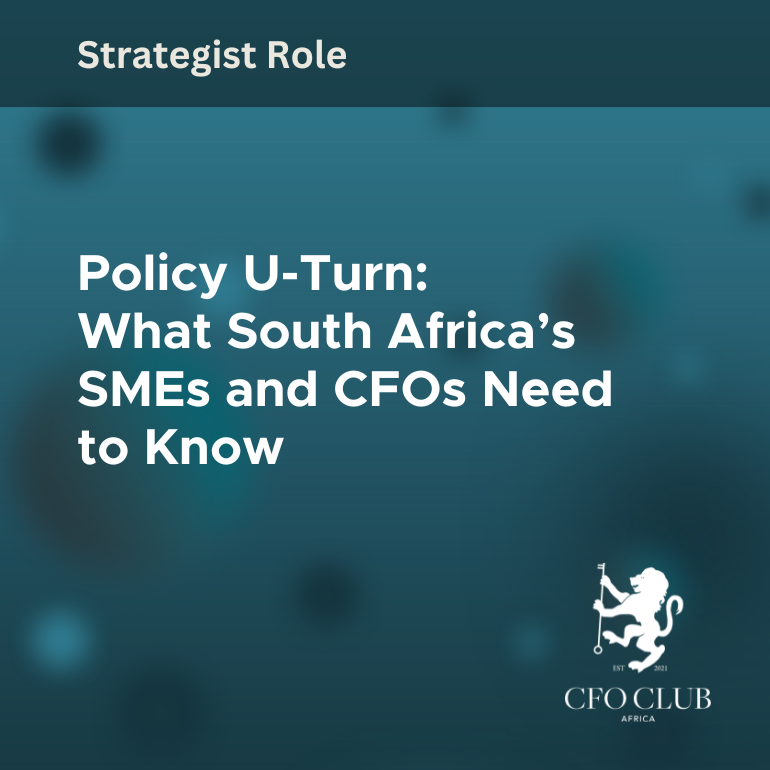Policy U-Turn: What South Africa’s SMEs and CFOs Need to Know
South Africa’s business community has once again been reminded that policy certainty is fragile. Two major regulatory initiatives, both aimed at shaping the environment for small businesses, have taken very different turns. While labour relations reform has been welcomed, proposed credit regulations were abruptly pulled, leaving CFOs to deal with the consequences of both.
Labour Relief for Small Businesses
The Department of Employment and Labour has gazetted a new Code of Good Practice on Dismissals under the Labour Relations Act. The purpose is to make dismissal procedures more practical for small enterprises that do not have the resources or in-house HR departments that corporates enjoy.
Previously, small businesses were expected to follow complex and expensive processes when addressing poor performance. These processes often included extended consultations, detailed documentation, and multiple hearings. The revised code recognises that these requirements can cripple a small employer, both financially and operationally.
The new framework still protects employees through fairness principles but allows SMEs to resolve underperformance issues faster and at lower cost. Business Leadership South Africa CEO Busi Mavuso welcomed the change, noting that it will encourage job creation by reducing the risks associated with hiring.
For CFOs, this reform provides an opportunity to revisit HR and compliance policies. Streamlining disciplinary procedures can lower operating expenses, reduce disputes, and free up management time. It also allows financial leaders to forecast staffing costs more accurately since the risk of protracted disciplinary action is reduced.
Credit Reform Withdrawn
The picture is less positive in the financial sector. Draft amendments to the National Credit Act of 2005, published in August, have been withdrawn by Minister Parks Tau after overwhelming public opposition. More than 20,000 submissions were received before the 12 September deadline, with most rejecting the proposed changes.
The draft would have significantly expanded the scope of Regulation 18, which governs what information credit bureaus may collect. Under the proposals, bureaus would have had access to records from state institutions, courts, insurers, utilities, debt collectors, fraud investigators, and even educational institutions. This would have meant student debt, criminal cases, and fraud inquiries could all appear on credit reports.
In addition, Regulation 19 would have required more complete submissions to credit bureaus, ensuring that lenders had highly detailed information before approving loans. For individuals, this raised fears of overreach and unfair targeting. For businesses, especially SMEs, it meant the potential for much more stringent checks before funding was approved.
Law firm ENSafrica argued that the amendments were designed to improve the accuracy of credit records and strengthen risk management. However, critics warned that the changes could reduce already limited access to finance by placing additional hurdles in front of small firms.
Tau’s withdrawal of the draft leaves the regulatory environment unchanged for now. But he has indicated that the proposals will be revisited, with a commitment to balancing consumer protection with improved access to finance for SMEs. For CFOs, this means uncertainty continues.
The Debt Backdrop
The controversy comes at a time when South Africans are heavily reliant on debt. DebtBusters reports that 91% of people entering debt counselling in the first quarter of 2025 had at least one personal loan, with 37% also carrying payday loans. Rising inflation and stagnant incomes mean households are using short-term credit to survive.
Eighty20’s Credit Stress Report for Q2 2025 showed an increase in overdue home loans and credit card balances, with defaults rising for the first time since 2023. On average, South Africans with credit spend 28% of their net income on debt repayments.
This context matters for SMEs and their CFOs. When households are stretched, consumer demand is fragile. At the same time, credit providers face higher risk, which makes them cautious about lending to smaller enterprises. The proposed regulations would have added an additional compliance burden at a moment when small business funding is already constrained.
What CFOs Should Do Now
- Labour: Align HR frameworks with the new dismissal code. Train managers on the revised processes and update internal policies to reduce costs while maintaining fairness. CFOs should model the potential savings from reduced disciplinary overheads.
- Credit: Plan for both scenarios. While the withdrawal means no immediate change, CFOs should prepare for the possibility of stricter lending requirements if revised amendments return. Keep documentation comprehensive, ensure business records are accurate, and build stronger cases for funding.
- Funding Strategy: Diversify sources of finance. Traditional loans may remain difficult for SMEs to access. CFOs should consider supplier credit, venture partnerships, private equity, or blended finance options.
- Risk Management: Use scenario planning to factor in policy volatility. What happens if stricter credit rules come into force in 2026? What if labour reforms face legal challenge? CFOs need contingency plans.
- Engagement: Proactively participate in consultations through industry associations. The business sector’s input will be critical if the National Credit Act amendments are revised. CFOs who engage early can shape outcomes that affect their access to finance.
Bottom Line
For South African CFOs, the twin developments highlight the unpredictable nature of policymaking. The dismissal code is a tangible win, offering cost savings and improved operational flexibility. The withdrawal of credit reforms, however, shows how easily progress can be reversed under political pressure.
Strategic CFOs should act now to capture the benefits of labour reform while preparing for an uncertain credit environment. In practice, that means tightening internal policies, diversifying funding strategies, and staying close to policy debates. In a volatile landscape, resilience comes from controlling what is within reach and planning carefully for what is not.





